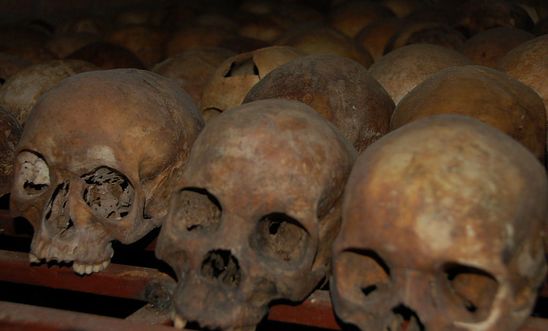
Press releases
The world still failing to act despite Rwanda genocide shame

The international community has collectively failed to act on the lessons of the Rwandan genocide, said Amnesty International today as the world marks the 20th anniversary of the human catastrophe which left around 800,000 dead.
Twenty years later, echoes of the events in Rwanda are reverberating in the Central African Republic, South Sudan and beyond.
Salil Shetty, Amnesty International’s Secretary General said:
“In 1994, the world was shamed when it turned a blind eye to the desperate cries for help coming from Rwanda. Africa and the rest of the international community wrung their hands as hundreds of thousands were slaughtered.
“The message is clear – this must never be allowed to happen again. Yet while leaders have accepted their mistakes, 20 years on it’s evident that the lessons have not been put into practice. Governments are still failing to take action to protect those in need in the looming catastrophes we face today.
“Recent events in the Central African Republic and South Sudan underscore the continued failure of regional and international efforts to deal with current conflicts in Africa. In the Central African Republic, we see ethnic cleansing on a massive scale. In South Sudan too, individuals have been killed or raped because of their ethnicity and assumed political affiliation.
“Failing to deliver more robust peacekeeping operations and ensure accountability for grave crimes in Africa only enables new tragedies of catastrophic proportions.“It is unacceptable that in the corridors of power in the United Nations, Europe and the African Union, bureaucratic prevarication and political power plays have scuppered repeated efforts to deploy additional UN peacekeeping troops in the Central African Republic fast enough. The horrific results are plain to see – death and destitution.
“Time is running out for the millions of men, women and children who are in desperate need of help in the Central African Republic and South Sudan. The world needs to act now.”
Background
Since December, Amnesty has been investigating ethnic cleansing, war crimes and crimes against humanity perpetrated in the Central African Republic despite the presence of African Union and French peacekeeping forces. Extra-judicial killings, rape and other forms of torture are committed daily. The conflict has forced hundreds of thousands of Muslims to flee to neighbouring countries where refugees live in dire conditions as another humanitarian crisis unfolds.
In South Sudan, more than one million people have been forced to flee their homes after conflict broke out in December. Extra-judicial killings, rape and other human rights abuses continue, often along ethnic and assumed political lines. Both government and opposition forces have engaged in the wanton destruction of property, attacks on hospitals and churches, and widespread looting leaving towns abandoned. Thousands of civilians continue to flee the country while hundreds of thousands remain displaced within South Sudan. With the rainy season imminent, a humanitarian catastrophe looms unless humanitarian assistance can reach civilians without delay.
In response to the violence, the UN Security Council unanimously agreed to increase peacekeeping force levels in South Sudan so that it could better carry out its mandate to protect civilians. However, despite the lessons learned in Rwanda, deployment has been slow.